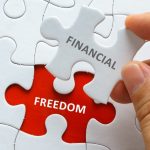 My latest MoneySense Retired Money column was just published, focused on Monday morning’s release of the 2019 RBC Financial Independence in Retirement poll.
My latest MoneySense Retired Money column was just published, focused on Monday morning’s release of the 2019 RBC Financial Independence in Retirement poll.
Click on the highlighted headline to retrieve the full article: The Magic numbers for your Findependence nest egg revealed.
And yes, they did use my term Findependence in the headline, which is a neologism I coined and is of course merely a contraction for Financial Independence.
May as well save a few keystrokes and/or syllables!
As I note in the column, I like the fact that RBC uses the term Financial Independence instead of the more commonly used “Retirement.” The two are not the same thing: it’s possible to be financially independent but not retired (that’s the case for myself and possibly many who frequent this website). But as I also note, it’s pretty hard to be retired if you’re NOT also financially independent. If the distinction eludes you, read my book Findependence Day.
In its poll, RBC can’t resist throwing out the figure $1 million as the level many non-retired Canadians believe is necessary to amass: not for “Retirement” per se, mind, but for what they call “a comfortable financial future.”
Call it what you will but RBC identifies four “top motivators” to accumulating such a nest egg: being debt-free, having things to make life more comfortable, having money to take part in desired experiences, and having enough to travel wherever you want.
BC needs $1 million for Findependence, Quebec just $427,000
So how much does it take to get there? Apparently, those in British Columbia need a little more than the rest of us: $1.07 million, compared to a national average of $787,000. Albertans think they need $916,000, those in Saskatchewan and Manitoba cite $907, 000 and Ontarians just $872,000. Quebecers have much more modest aspirations, believing just $427,000 will get them the kind of financial independence they desire. And there’s a bit of gender divide on this topic: Men believe they’ll need $942,000, compared to women at just $650,000. Given that women tend to outlive men, I’d argue that should be the other way around.
RBC cites four action items to achieve this kind of financial independence: spend less on non-essentials [74% cite this], eat out less [59%], postpone major purchases [45%], and cut back on travel [34%]. I find this list a bit ironic: cut back on travel now so you can travel in style later, eat out less now so you can indulge in fine dining later, and so on, but that’s the basic paradigm of saving and investing: Delay gratification, live within your means, eliminate debt, and then grow your nest egg.
The RBC materials emphasize the growing availability of online digital resources, including their own “MyAdvisor” online service and other resources on savingandretirement planning.
The MoneySense piece looks at asset allocation and how to invest to achieve financial independence. According to RBC, there are six portfolios that match investor objectives to various rates of return, varying from Secure to Aggressive Growth:
Investor Objectives; Rate of Return
- Secure; 2.5%
- Very conservative; 4.1%
- Conservative; 4.6%
- Balanced; 5.2%
- Growth; 5.8%
- Aggressive growth; 6.7%

